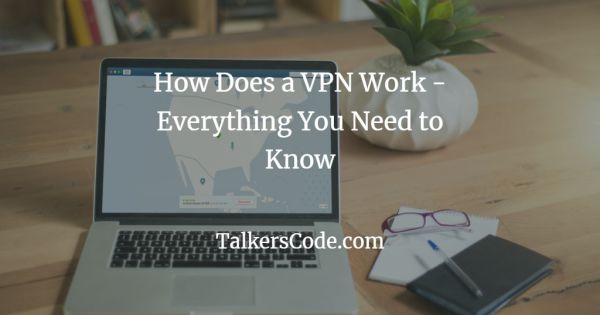Virtual Private Networks, more commonly known as VPNs, are efficient and accessible online safety solutions.
Everybody knows that you can enhance your privacy and internet freedom through a VPN - the question is, how?
To understand advanced concepts, we must first return to the basics. Basically, a VPN is an amalgamation of encryption, safe connectivity, and general secure programming practices. Every user on the internet is exchanging data with other online servers.
The main goal of a VPN is to build a secure, encrypted fortress between you and other parties.
However, the intricacies of VPNs are much deeper than that. This is why we’re going over everything you need to know about them, so you can ultimately get a safer and private browsing experience.
The Building Blocks - What Is a VPN ?
A VPN builds a safe connection between you and the web. This is achieved by rerouting your data through an external, private server.
This server is the main facility a VPN provides. A VPN server takes on a middle-man role between you and the internet, therefore securing your data and identity.
Encryption is another key aspect of a VPN. It works on the principle of turning data into an unreadable and unbreakable form, in order to protect against attacks and exploitation.
So, once you’re connected to a VPN, your information gets encoded into unreadable gibberish.
The next step consists of replacing your personal IP address with that of the VPN server, therefore hiding your identity as you exchange information with other websites.
In short, a VPN consists of an external server, encryption mechanisms, and IP anonymity.
How Does a VPN Work?
All VPNs follow a standard protocol with specific steps in order to encrypt your connection. Here’s a simple breakdown of the inner mechanisms of a VPN.
- The VPN program operating on your system encrypts your outgoing traffic. Next, it is passed through your ISP (Internet Service Provider). However, they can’t go through your data since it’s encrypted. Ultimately, it reaches the VPN server in an untouched, unreadable form.
- Once received by the VPN server, your data is decrypted using a strong key/password.
- The decrypted form of your data is sent to the server you initially intended to connect to. But now it’s sent through a private, secure server - so you’re anonymous.
- The third-party sends a reply to your query which is received by the VPN server. This reply is once again encrypted and sent back to you safely.
- Finally, the VPN program running on your system decrypts server data and presents it to you in a readable and once again, untouched form.
With that being said, there is another crucial detail that must be kept in mind. The VPN software on your computer acts as a background process.
This means that you can use the internet as you would normally, except you’d be now under several layers of encryption and safety. That’s the magic of VPNs.
Types of VPNs :-
There are many VPN types that you can choose from. Some kinds work only to secure your online browsing, whereas others anonymize all of your applications, not just the web browser.
1. Standalone VPN Applications
The most popular type of VPN is the standalone application form. These VPNs work through applications that are designed to not only establish a connection to a private network but also optimize it.
This ensures fast connectivity and tiny load times, a rarity among many VPNs. Standalone VPN applications work best for small, private businesses and homes.
2. Router VPN
If you’re looking to protect not only one device but your entire network of devices, a router VPN is the way to go. Since all your devices are connected to your router, you won’t have to go through the trouble of individually installing or enabling the VPN on each device.
Another benefit is that you won’t have to log in again and again.
To get this type of VPN running on your system, you’d obviously need a VPN service and a router. However, you can get routers that are specifically built to work with VPNs.
They may cost a little extra, but the convenience factor makes them worth the money.
3. In-Browser VPN
In-browser VPNs are second only to standalone VPN applications in terms of popularity. These work as extensions that you can add to your browser.
In-browser VPNs come later down the list only because there have been reports of IP leaks and vulnerability in the past.
Additionally, they are also limited to your browser, meaning that other apps running on your system won’t be protected. If you do decide to go for a browser extension VPN, make sure to get it from a reputable source.
This will ensure that you don’t get your data stolen by malicious extensions built by scammers.
4. Corporate VPN
Corporate VPNs are the answer to a huge company/organization’s internet safety needs. During the pandemic, many companies are switching their on-site infrastructure to more remote options.
Corporate VPNs allow an organization’s employees to safely and privately communicate and work from home.
Typically, this type of VPN is curated specifically to meet large user bodies. This is why the only drawbacks of corporate VPNs are an expensive paycheck and demanding IT resources.
Having said that, VPNs aren’t the only way to increase company security - hardware solutions are a viable option too. Learn which 8 smart devices can enhance your office security.
Different VPN Protocols
You may be wondering, technical talk and all that jazz is good, but how secure is a VPN actually? The answer to that lies in the technology upon which it is developed. These different technologies are commonly called protocols.
1. PPTP - Point-to-Point Tunneling Protocol
Made by Microsoft in the earlier days of the internet, PPTP is one of the oldest and most popular VPN protocols ever. However, as we advanced into this field of technology, PPTP got outdated and ultimately replaced.
2. L2TP - Layer 2 Tunneling Protocol
The PPTP system integrated with the hardware networking L2F protocol gave birth to L2TP. It is definitely superior to PPTP but falls short in terms of encryption and privacy.
3. OpenVPN
Enough talk of outdated technologies, OpenVPN is the modern, go-to VPN protocol out there. It is open-source, effective, and powerful. It’s survived many security audits and is probably your best bet if you’re looking to get a VPN for yourself.
To Sum Up
VPNs consist of three main building blocks - a server, encryption capabilities, and anonymity methods. When put together well, they can not only hide your identity but also give you an overall safer experience on the internet.
Thanks to advances in secure programming and cybersecurity, the average internet user can now browse the internet more freely than ever.
Recommended Articles
Tags - Increase Website Traffic | Published On - 9 Apr 2023
Tags - Increase Website Traffic | Published On - 9 Apr 2023
Tags - Increase Website Traffic | Published On - 9 Apr 2023
Tags - Make Money Online | Published On - 9 Apr 2023




